Burundi

A serious breakdown between the powerful Roman Catholic Church and the government in Burundi is raising concerns over stability in the East African nation, as senior government officials accuse the church of sponsoring violence. Since April 2015, the country has been racked by chaos after President Pierre Nkurunziza agreed to run for a third term. Catholic bishops had strongly opposed the move, saying the constitution was clear that a president should serve only two terms.

“There is nowhere a human being should be allowed to enslave others.”
This is a statement made by Burundian Catholic Archbishop Simon Ntamwana, referring to the Burundian president who was seeking an extra term in power. The archbishop was implicitly calling the president's actions unjust and unacceptable.
Indeed, the term limit crisis in Africa needs to be considered in the same light as the liberation, decolonization, and democratization movements against slavery and apartheid. Similarly to those struggles in history, today's term limit crisis in Africa is characterized by people struggling against oppression and political injustice.

1. How would you describe Akilah Institute’s goals for its students and alumnae? Rwanda today is a far cry from the genocide-torn country that most think of when they hear about it. Rwandans have a vision of a knowledge-based economy, and Rwanda is fast becoming the region’s leader in information technology and new business development. And yet, only 1 percent of Rwandans attend university, and just 30 percent of these are women. We want to make sure that young women have a part to play in building the country’s future.
Akilah’s unique model of market-relevant education empowers young women to launch professional careers and assume leadership roles when they graduate. During their three years at Akilah, students develop English fluency, leadership, public speaking, and critical-thinking skills.

Three elderly Italian nuns murdered in Burundi were laid to rest Sept. 11 in a Xaverian cemetery in the Democratic Republic of Congo amid heightened calls for action about their death.
Sister Lucia Pulici, 75, Sister Olga Raschietti, 82, and Sister Bernadetta Boggian, 79, of the Xaverian Missionary Sisters of Mary were gruesomely murdered Sunday in their convent in the Kamenge area of Burundi’s capital, Bujumbura.
The triple murders shocked Christians across the globe and ignited calls for the protection of sisters worldwide. The nuns were reportedly beaten and killed with a knife. At least one nun was decapitated. There were conflicting reports about whether they had been raped.
The breeze was blowing off of Lake Tanganyika, and I was enjoying the evening with a friend at the Hotel Club Du Lac. We were enjoying a cold drink and good conversation when it occurred to me that the beachfront was filled with foreigners enjoying the beach at sunset. It was July 1, and the beach was teeming with laughter, BBQs, and a game of volleyball. This is something we have not witnessed in Burundi for more than 15 years, and it was almost like a dream as I watched the good [...]